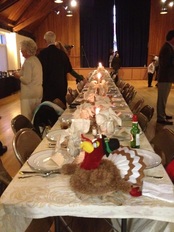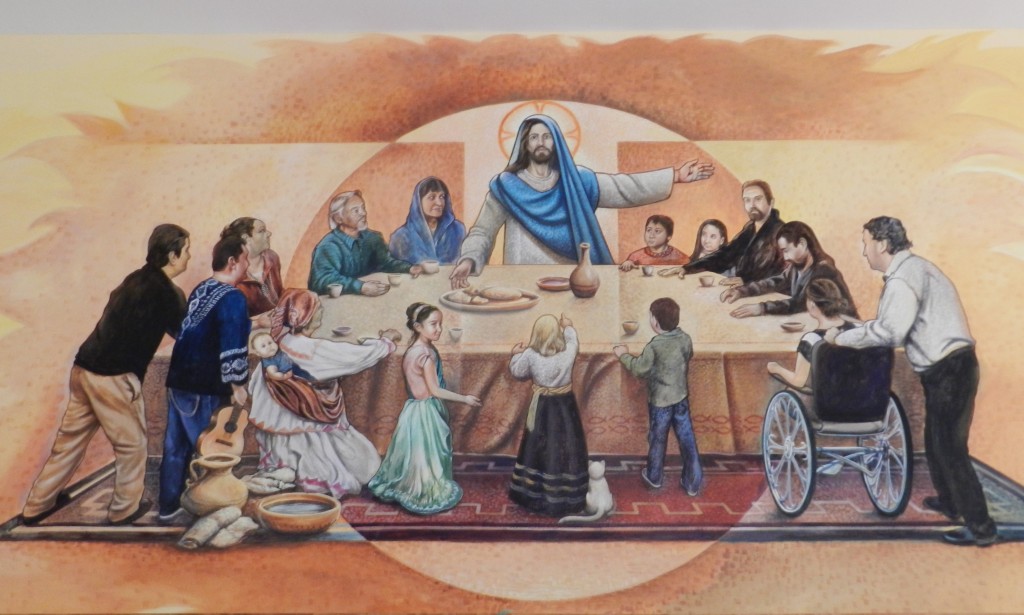This bread and cup are the great equalizers; it calls all who are hungry to become brothers and sisters in God’s family. Today on the liturgical calendar the church celebrates Transfiguration Sunday. But today is also Boy Scout Sunday, Communion Sunday, and Super Bowl Sunday. While each one of these traditions is a sermon all on its own, I feel compelled to squeeze them together into one. I will attempt to do this by beginning with the popular Congregational tradition that every good American church loves to celebrate with us. That tradition, as you may have probably already guessed, is Thanksgiving. Now, I cannot speak of this tummy stuffing holiday without thinking about my wife’s insanely large, Irish-Catholic family. Gathering together for a regular meal consists of taking shifts at the dinner table. And when we decide to eat out, our choices are limited to restaurants that have banquet rooms. Every Thanksgiving my mother-in-law rents out the large hall at the church, 1) because it’s the only place big enough to accommodate a large gathering. And 2) because they have just enough tables and chairs to seat us all. From end-to-end, the main table measures somewhere between 70-80 feet. Then there are the children’s tables which are divided by the varying age groups. In all my years of celebrating this tradition with them, I have yet to see a child move up from one table to the next. Much to the protest of the older kids, whenever one adult passes on...another adult is invited from outside the family to fill in the space. If this intimate and rather loud gathering has taught me anything it is this: some traditions remain the same, year after year. And that’s ok. Next, we see in Luke’s gospel how Peter, James and John instinctively gravitate towards the old and comfortable traditions of Israel. Luke says when they follow Jesus up the mountain to pray, something very strange happens. Jesus begins to change. His face begins to glow. His clothes become a blinding and dazzling white. Appearing right before their very eyes are Moses and Elijah. And if that's not amazing enough, God speaks to them. Standing there in the great cloud of God’s glory, this lucky trio gets to witness the divine and human natures of Christ collide and transform. It is here, on the rocky slopes of some mountain top, the torch is passed so to speak, from the old covenant of the Laws and Prophets (represented by Moses and Elijah) to the new covenant, which is Jesus Christ our Lord. This is a momentous occasion for anyone. And how does Peter respond? Like any devout Jew, he feels the need to erect an alter to God. In fact, he wants to build three! This is an ancient practice that goes back to Noah and Abraham. It's a way to mark a place sacred where God had made his presence known. And in such important company, Peter wasn't about to break from tradition. There is nothing wrong with honoring God’s glory with sacred rituals. But for the disciples, it causes them to miss the bigger picture; God is giving them a foretaste of the reality and the glory that is to come. What we learn here is that some traditions not only bind us but they can also blind us and keep us from seeing and living out the glory of God in the world. Traditions are good, but do they need to be so rigid? As we celebrate the Boy Scouts, we are reminded of how much this great tradition has helped our community. But like so many other organizations, they have to keep up with the changing times if they wish to survive. By their ability to adapt, the scouts have become a much more diversified organization. As tough as it can be to make certain changes, I’d argue that by being more inclusive only makes God’s glory shine brighter. What organizations like the Scouts teach us is: that it's natural, and even healthy, for a tradition to evolve. In the case of the Super Bowl, change is exactly what makes the tradition thrive. I mean, let's really think about it. How successful would the game be if it were the same old show year after year? Would viewership continue to amass record-breaking numbers? Would advertisers continue to pay outrageous fees to air their spots? The NFL has worked hard to come up with new ways to keep the Super Bowl fresh and entertaining. This year they're using new camera technology to creates a 360 degree perspective so viewers at home can feel like we are there. The lesson here is this: even though they are constantly changing, some celebrations never lose sight of what made it a tradition in the first place. So what does this say about the church, and the traditions that we uphold? What does the sacred ritual of Communion, for example, have in common with the secularism of say...the Super Bowl? I believe the answer is right here…in the bread and cup which we share as a gathered community. In houses and public venues across the country, a smorgasbord of people gather to celebrate one glorious event. Around tables of food and drink, men and women from every demographic meet up to laugh together, sing together, shout together, and even pray together. Even though we may stand on different sides the joyfulness of this tradition finds its way to unite us. Jesus tells his host at the dinner table, “When you throw a party, invite the crippled, the lame, the blind, and you will be blessed” (Luke 14:13-14). Jesus then begins to tell the parable of a guy who throws a great big party. When those on the guest list refused his gracious invitation, the man instructs his servants to go out on the streets and alleyways, and bring the tired, hungry, poor, and lonely. Go out to the margins of society and compel them to come. Let them know there’s enough to go around (Luke 14:15-24). "This is what God’s kingdom will look like," says Rachel Held Evens; “a bunch of outcasts and oddballs gathered at the table, not because they are rich or popular or worthy or good, but because they are hungry” (Evans, 2015). Who here is hungry? Hungry for something more than what you can give yourself. Come and get your fill. Feast on the glory of God. Come to this table and feast on a meal, that Richard Beck calls, “an inherently moral act.” For some reason we who would never associated with each other in the larger society are willing to sit as equals around the Table of our Lord to feast on grace, justice, love and peace. Beck describes this sacrament as a moment…which “brings real people into a sweaty, intimate, flesh-and blood embrace where there shall be no difference between them and the rest.” Long enshrined traditions aside, there are those who see themselves as bouncers at the entrance of the heavenly banquet hall. They slam the door of the kingdom on people's faces and tell them to come back when they are sober, doubtless, sinless, submissive and straight. This isn't a kingdom for the worthy; it's a kingdom for the hungry" (Evans, 2015). This is not our table. This is God’s table. This is not our meal. It is God’s feast, given in abundance for all whose bellies are in need of being filled. This church invites you, sinners and saints alike, to get your fill of God’s full glory. Come and sit and be with Jesus, who gave us this promise, “Where two or three are gathered in my name, I am also here with you.” By this sacred promise, Jesus' covenant is memorialized in our communion with each other. It is here, in this monumental tradition, dividing lines are erased and opposing sides are transformed. This bread and cup are the great equalizers; it calls all who are hungry to become brothers and sisters in God’s family. Through Christ we no longer sit at separate tables. Instead a bunch of mismatched, messed up hungry people…adults and children alike, squeezed together, elbow-to-elbow, knees-to-knees…to feast upon the celebration of God’s salvation. As we pass the bread and share the cup, let us rip off the veil that hides God’s divine glory and let's shine throughout the world. Together we will be one Church of the one true God who opens his doors to us and says, “Welcome. Here, have some wine!” (Move towards communion) Works Cited Bible, NRSV. Exodus 34:29-35; 2 Corinthians 3:12-4:6; Luke 9:28-36. I am so grateful to Rachel Held Evans and her book for inspiring many of the words and all the wonderful quotes used in this sermon. Evans, Rachel Held. Searching for Sunday. Loving, Leaving, and Finding the Church. Nashville: Nelson Publishing, 2015. pp. 146-153. Comments are closed.
|
Ian MacdonaldAn ex-copywriter turned punk rock pastor and peacemaker who dedicates his life to making the world a better place for all humanity. "that they all might be one" ~John 17:21“Prius vita quam doctrina.”
~ St. Thomas Aquinas (1225–1274) * “Life is more important than doctrine.”
Archives
June 2024
|
